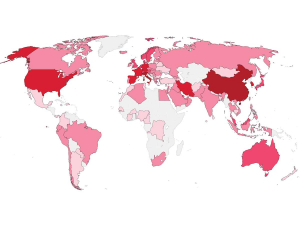Editorial: Happy days
OPINION: The year has started positively for New Zealand dairy farmers and things are likely to get better.
 With over 130,000 cases worldwide Coronavirus isnow a pandemic. Dark areas have more than 10,000 cases.
With over 130,000 cases worldwide Coronavirus isnow a pandemic. Dark areas have more than 10,000 cases.
Covid-19 is forecast to strip more than $1.3 billion dollars off New Zealand’s primary exports in the coming year, including $390 million off dairy exports.
This latest revelation comes in the Ministry for Primary Industries latest Situation and Outlook Report, released late last week.
In December MPI were forecasting that primary exports for the year ending June 2020 would be $47.8 billion – now this has been reduced to $46.5 billion, a mere 0.5% up on the 2019 total. It is also warning of further downward revisions. The report came out the day World Health Organisation declared coronavirus a pandemic.
The report states that while the geopolitical tensions on trade such as Brexit and the US-China trade war have eased somewhat, coronavirus has added new uncertainty for NZ primary exporters. It notes that the seafood and forestry sectors have been particularly badly hit. But it points in the last month dairy commodity prices have softened and the average price on the GDT fell 7.5%.
It says there has been weakness in milk powders, butter, and anhydrous milk fat. However, despite the disruptions in Chinese markets, North Asian buyers have continued to be active in recent auctions, with volumes traded higher than at the same time the previous year. It adds that prices for cheese and casein have continued to strengthen.
MPI predicts that continued declines in key commodity prices will impact farm gate milk price payouts but it says given the strength of current export prices, strong payouts are still likely and will continue to support dairy farmer profitability this season. It say an average payout of $7.15/kgMS is likely.
Fonterra will announce its half-year results this week: coronavirus is likely to have an impact.
Accoriding to MPI, while revenue from the dairy sector is down on the December forecast, it is still ahead of the previous year and is expected to earn about $19.2 billion. The report also notes that despite the drought in the major dairying regions milk production for the first eight months of the season was up by point five of a percent.
Meat and horticulture exports have also taken a hit with revenue from meat down by $220 million and horticulture by $110 million.
The as yet unknown factor says the report is the fate of the NZ dollar which has already weakened since the beginning of this year. MPI says should the weakening in our key agricultural commodity prices continue to worsen, they would expect further adjustments in the NZ$ to help offset some of these effects for primary sector exporters. And MPI warns further revisions downward in future forecasts are likely.
The World Wide Sires National All Day Breeds Best Youth Camp Best All Rounder plaudit has become family affair, with 2026 Paramount Cup winner Holly Williams following in her sister Zara's footsteps.
DairyNZ is giving New Zealand farmers a unique opportunity to gain hands-on governance and leadership experience within the dairy sector.
Herd improvement company LIC has posted a 5.2% lift in half-year revenue, thanks to increasing demand for genetics.
According to the latest Fresh Produce Trend Report from United Fresh, 2026 will be a year where fruit and vegetables are shaped by cost pressures, rapid digital adoption, and a renewed focus on wellbeing at home.
The Roar is a highlight of the game hunting calendar in New Zealand, with thousands of hunters set to head for the hills to hunt male stags during March and April.
OPINION: The past few weeks have been tough on farms across the North Island: floods and storms have caused damage and disruption to families and businesses.